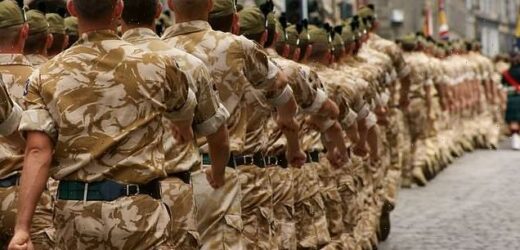A quarter of Britain’s soldiers are classed as ‘dangerously’ overweight in the past five years, with more than 5,000 discharged for being overweight or obese since 2010
- 40,000 of the military’s 145,000 personnel were overweight or obese this year
- The heaviest member ordered to leave on tipped the scales at 30 stone
- More than 850 troops have been prescribed with diet pills since 2014
One in four troops have been officially classified as dangerously overweight or obese, The Mail on Sunday can reveal.
Top brass were last night accused of a ‘failure of leadership’ over the Army’s expanding waistline.
Almost 40,000 of the military’s 145,000 personnel have been classed as overweight or obese in the last five years.
It can also be revealed that 5,200 obese or overweight soldiers have been medically discharged since 2010.
Top brass were last night accused of a ‘failure of leadership’ over the Army’s expanding waistline. Stock image
The heaviest member of the military ordered to leave on medical grounds tipped the scales at a staggering 30 stone. More than 800 troops medically discharged weighed more than 18 stone.
The MoD statistics also reveal that more than 1,100 have developed Type 2 diabetes, which is linked to weight problems, and that 1,113 troops suffer from high blood pressure. More than 100 troops have heart disease.
To combat the problem, more than 850 troops have been prescribed with diet pills since 2014. More than 60 have had liposuction surgery.
Col Richard Kemp, a former commander of British troops in Afghanistan, said: ‘Every overweight service man or woman became overweight while serving. Except for those who acquire an illness or injury that results in obesity there is no excuse for this. It represents a failure of leadership among those responsible for ensuring troops under their command remain fit and healthy and ready to fight. Allowing soldiers’ health to decline in this way is the same as neglecting a weapon system or combat vehicle to the extent it cannot function when needed.’
Former Army chief Lord Dannatt said: ‘I believe young overweight soldiers should be monitored very carefully and if their weight cannot be controlled, they should be discharged. Too many older soldiers put on weight as the nature of their duties change but their diet does not. Rigorous enforcement of the physical fitness tests is essential. I wonder if a blind eye is turned to older soldiers too often. The solution to this obesity and overweight issue is very much a chain of command matter.’
The disclosure follows claims by an Army physical training instructor who warned that the woke ‘body positivity movement’ was promoting obesity.
Ferren Morgan, 36, a Lance Sergeant in the Coldstream Guards, said: ‘Recruits and candidates influenced by a lifestyle of body positivity lose sight of the importance of consistently maintaining an active and healthy lifestyle which translates into a decline in their physical performance.
‘Body positivity is a lifestyle that promotes complacency and is detrimental to the lives of young soldiers and recruits.
‘People always talk about body positivity – being big is OK, and all that sort of stuff. I see that as promoting obesity.’
The MoD uses a Body Composition Measurement (BCM) – which comprises of a Body Mass Index (BMI) measurement and a waist measurement in their risk assessments.
The BMI is calculated by dividing weight in kilograms by height in metres. A person is described as being overweight if they have a Body Mass Index (BMI) of 25 to 29.9. If their BMI is 30 or above they are clinically obese. The armed forces compare the BCM and the BMI because some soldiers will be very heavy for their height but the weight may be due to muscle and not fat.
Using the BCM method, 39,536 personnel were at increased risk of ill health because they were overweight.
An MOD spokesperson said: ‘Personnel can have multiple causes listed in a medical discharge, so may not have been discharged specifically for weight related issues.
‘The Armed Forces represents a physically demanding occupation and we continue to ensure all personnel are fit to undertake their duties. This includes physical testing to meet the necessary standards, tailored health programmes and robust fitness education.’
Source: Read Full Article



